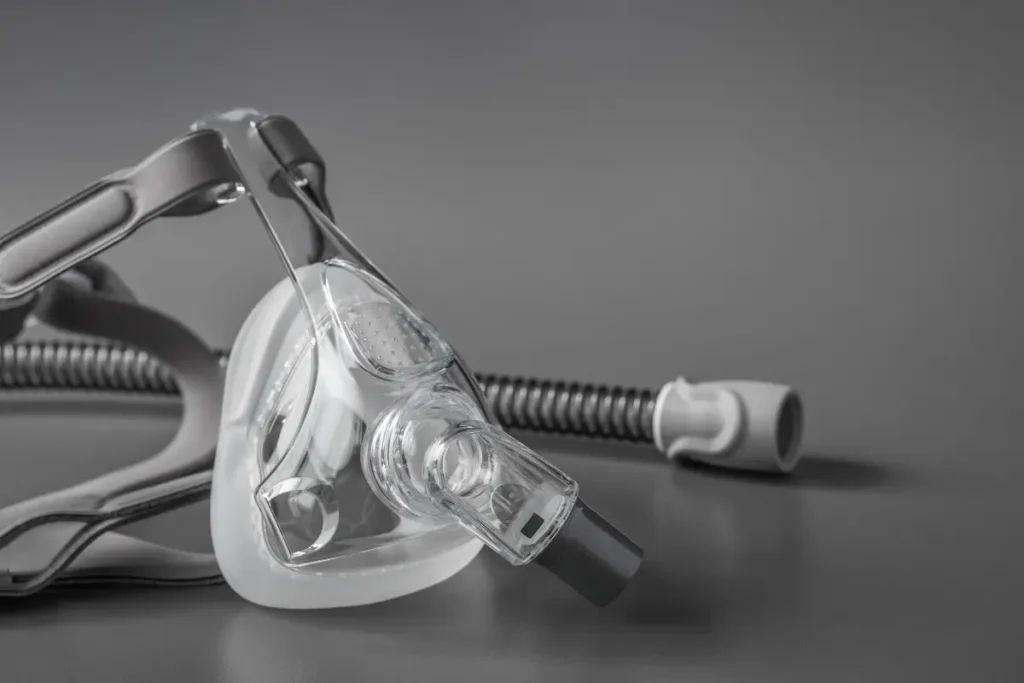CPAP Lawsuit
Continuous Positive Airway Pressure (CPAP) machines are miraculous devices that utilize pressurized bursts of air to keep open the airways of individuals with obstructive sleep apnea. Without a CPAP machine, patients’ throats relax too much and obstruct breathing.

Home » Defective Medical Device Lawyer » CPAP Lawsuit
- What is the CPAP lawsuit?
- What issue prompted the recall?
- How can I tell if my machine is part of the CPAP machine recall?
- What should I do if I have a recalled CPAP machine?
- Can I sue Philips Respironics?
- How much is the CPAP lawsuit worth?
- How much time do I have to file a CPAP recall lawsuit?
- Do I need an attorney to help me file my Philips CPAP recall lawsuit?
Patients rely on manufacturers to provide safe products. Those that design defective products and knowingly conceal safety hazards to vulnerable patients must be held accountable. This is exactly what Philips Respironics, the world’s largest manufacturer of CPAP products, has done. The attorneys who handle defective medical device lawsuits at Milavetz Injury Law, P.A. are committed to holding Philips accountable for its grievous conduct.

What is the CPAP lawsuit?
Philips Respironics voluntarily recalled several CPAP, BiPAP, and ventilation machines on June 14, 2021, as a result of dangerous product defects. Approximately three to four million machines are in use, and a large volume of lawsuits is expected.
These cases have been transferred to multidistrict litigation (MDL). MDL cases are assigned to a single federal judge when a large volume of cases is expected with similar facts. Unlike class-action lawsuits, each case remains separate.
The judge selects a few cases, known as bellwether cases, to hear at trial. These serve as test cases to gauge the outcome of the remaining cases. This increases the likelihood of the defendant offering a fair settlement.
Lawsuits against Philips Respironics have been transferred to the Honorable Joy Flowers Conti in the Western District of Pennsylvania and must be filed under MDL 3014.
What issue prompted the recall?
In 2014, Philips became aware that the polyester-based polyurethane (PE-PUR) used to abate sound and vibration in many of its breathing machines breaks down or degrades. This results in two harmful processes:
- Small black particulates from the PE-PUR enter the airways
- The PE-PUR off-gasses and exposes the patient to volatile organic compounds (VOCs)
Health Effects of Recalled CPAP Machines
Both of these processes can cause catastrophic harm.
Some of the particles are small enough to penetrate the lungs and become absorbed into the bloodstream. Breathing in the particles has caused the following conditions:
- Irritation to the skin, eyes, nose, and airway
- Inflammation in the airways or throughout the body
- Headaches
- Asthma
- Toxic effects on the organs
- Cancer
Exposure to VOCs has equally damaging health effects and can cause the following:
- Headaches and dizziness
- Irritation to the eyes, nose, airways, and skin
- Immune system reactions, such as allergic reactions
- Nausea or vomiting
- Toxic effects on organs and tissues
- Cancer
Although the company knew about these risks by 2014, it did not report them to the FDA or warn patients or health care providers until 2021, two weeks after releasing a second generation of the product. During the interim, Philips and the FDA received numerous complaints that patients experienced the following adverse events:
- Pneumonia
- Cancer
- Asthma
- Respiratory problems
- Infection
- Headache
- Cough
- Difficulty breathing
- Dizziness
- Nodules
- Chest pain
How can I tell if my machine is part of the CPAP machine recall?
The recall impacts CPAP, BiPAP and ventilators that were manufactured from 2009 to April 2021:
- Continuous airflow:
- DreamStation ASV
- DreamStation ST
- AVAPS
- SystemOne ASV4
- C-Series ASV
- C-Series S/T and AVAPS
- OmniLab Advanced+ Continuous Ventilator
- E30 Ventilators
- Non-continuous airflow:
- Non-continuous SystemOne (Q-Series)
- DreamStation
- DreamStation Go
- Dorma 400
- Dorma 500
- REMstar SE Auto Noncontinuous Ventilators
What should I do if I have a recalled CPAP machine?
Should I stop using my recalled CPAP machine?
You should not stop using your device until after you have discussed your options with your doctor. If a similar device is available your doctor may switch you to that device. Otherwise, your doctor may advise you to:
- Continue using the device until a replacement is available if the benefits outweigh the risks.
- Review the age of your machine. Philips recommends obtaining a new device every five years. If your device is more than five years old, your insurance may cover a new device.
- Stop using the device and instead use an alternative form of treatment.The FDA recommends the following alternative treatments for sleep apnea if approved by your physician:
- Positional therapy, such as elevating your head or avoiding sleeping on your back
- Oral appliances
- Surgery
- Lifestyle changes
- Lose weight
- Avoid alcohol
- Stop smoking
The FDA has requested that Philips complete additional testing on the silicone-based foam used in replacement models. This foam failed one safety test in overseas models, but not in U.S. models. As a result, the safety of the replacement model is not confirmed.
How to Obtain a Replacement
To request a replacement, register your device at the Philips update website. The company expects to issue all replacements by the end of 2022. The company may request that you return your current model, but you will need it for evidence in a lawsuit.
You can obtain the company’s authorization to retain the device for a lawsuit by registering your device on the company’s Preservation Registry.
Can I sue Philips Respironics?
If you are currently using a recalled Philips breathing machine or if your health has been harmed because of your use of a recalled machine, you may be eligible to file an action against Philips Respironics. Our attorneys offer a free case evaluation to help you establish your eligibility.

How much is the CPAP lawsuit worth?
The amount you can recover through a CPAP action depends on the type of claim and injuries you sustained. If you have been diagnosed with cancer or another permanently disabling condition, your compensation may be substantial. Compensation will be easier to estimate after the bellwether cases are completed.
Types of Claims
When Philips Respironics knowingly marketed and sold harmful medical devices to the public, it broke numerous laws, a fact that lends itself to a multitude of claim types, all of which will be considered under the MDL:
- Breach of warranties
- Unfair business practices and violations of consumer law
- Fraud
- Personal injury claims on the bases of marketing a defective product, negligence and failure to warn
Types of Damages
You may qualify for the following damages:
- Monetary losses
- Pain and suffering
- Punitive damages
- Substantial punitive damages are expected due to Philips’ willful decision to sell a harmful product to millions of unsuspecting patients.
How much time do I have to file a CPAP recall lawsuit?
Do I need an attorney to help me file my Philips CPAP recall lawsuit?
Filing a product liability claim is complex, especially when the cases are in MDL. The attorneys at Milavetz Injury Law, P.A. have a long, successful record of winning significant verdicts and settlements on behalf of clients who have been harmed by large companies like Philips Respironics.
Our attorneys are compassionate and dedicated to providing everyday people with a fair chance against large companies that care more about profits than people. Contact us today for a free consultation.
Discuss Your Legal Questions With A Member Of Our Team
"*" indicates required fields




Speak to an Attorney Today
Let Us Help You With Your Financial Help & Compensation Options


